Abstract
OBJECTIVES: The purpose of this study was to determine psychological consequences of teaching cardiopulmonary resuscitation (CPR) to family members of patients at risk for sudden death. METHODS: Patient-family pairs (n = 337) were randomized into one of four groups: control, CPR only, CPR with cardiac risk factor education, and CPR with a social support intervention. Only family members received CPR training. Data on emotional state and psychosocial adjustment to illness were collected at baseline, 2 weeks, and 3 and 6 months following CPR training. RESULTS: There were no significant differences in the emotional states of family members across the four groups. However, significant differences in psychosocial adjustment and emotional states occurred in patients across treatment groups following CPR training. Patients whose family members learned CPR with the social support intervention reported better psychosocial adjustment and less anxiety and hostility than patients in the other groups. Control patients reported better psychosocial adjustment and less emotional distress than patients in the CPR-only and CPR-education groups. CONCLUSIONS: These findings support tailoring family CPR training so that instruction does not result in negative psychological states in patients. The findings also illustrate the efficacy of a simple intervention that combines CPR training with social support.
Full text
PDF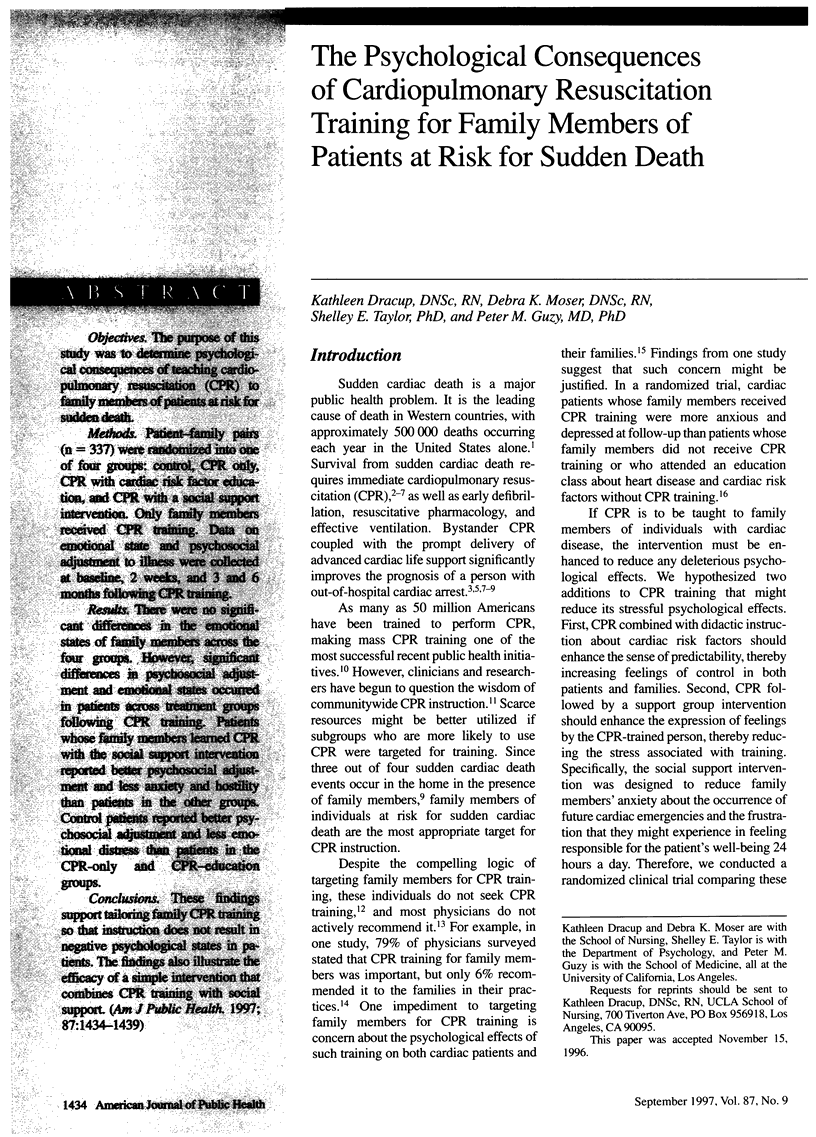
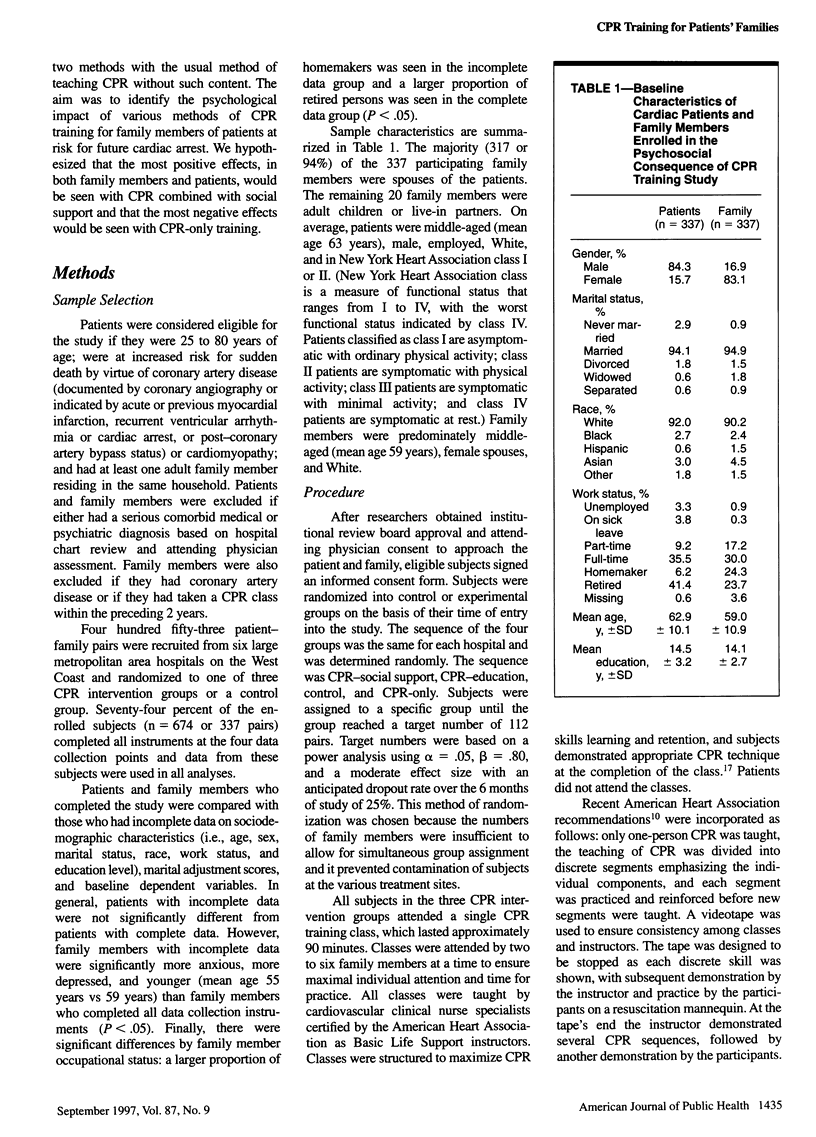
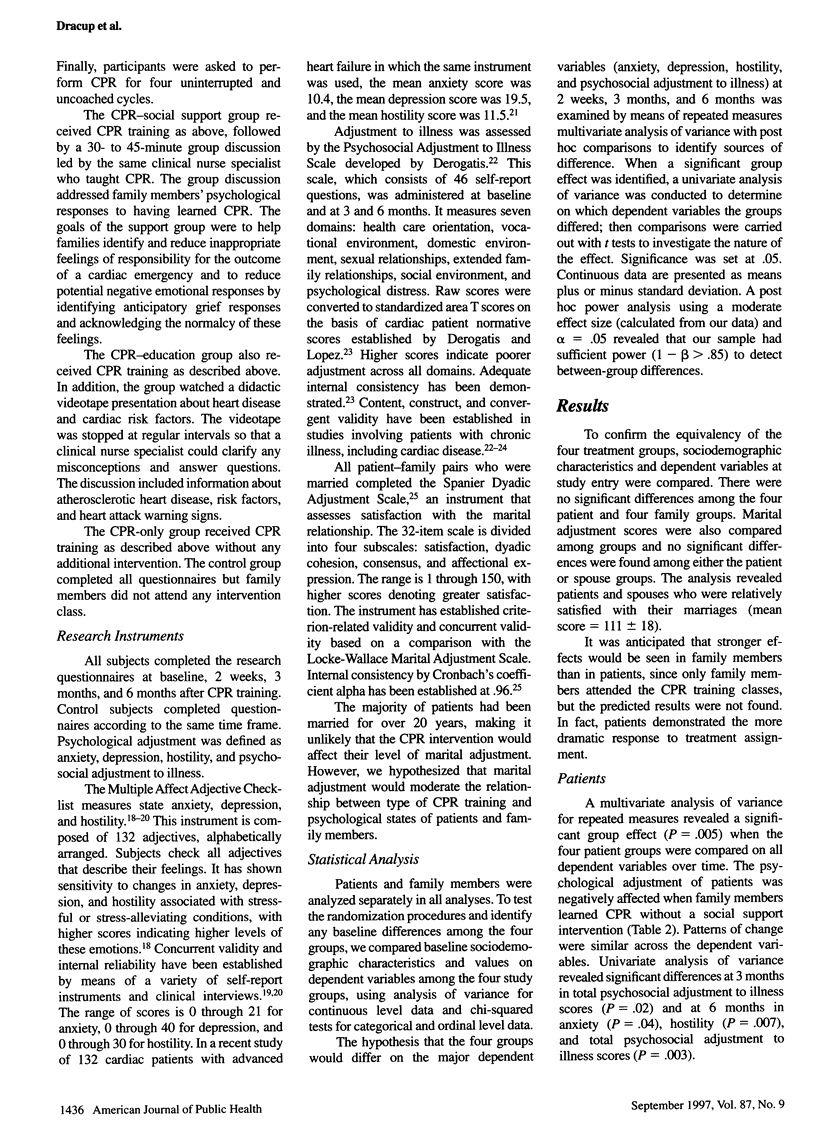
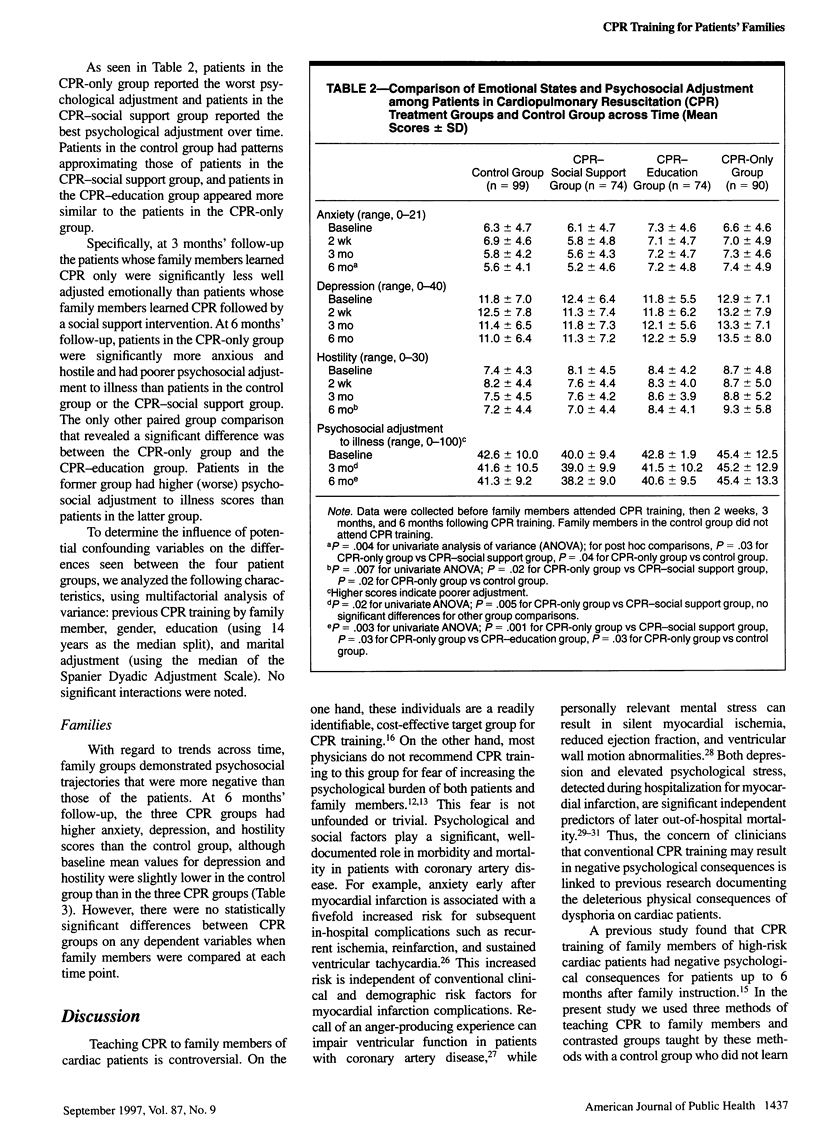
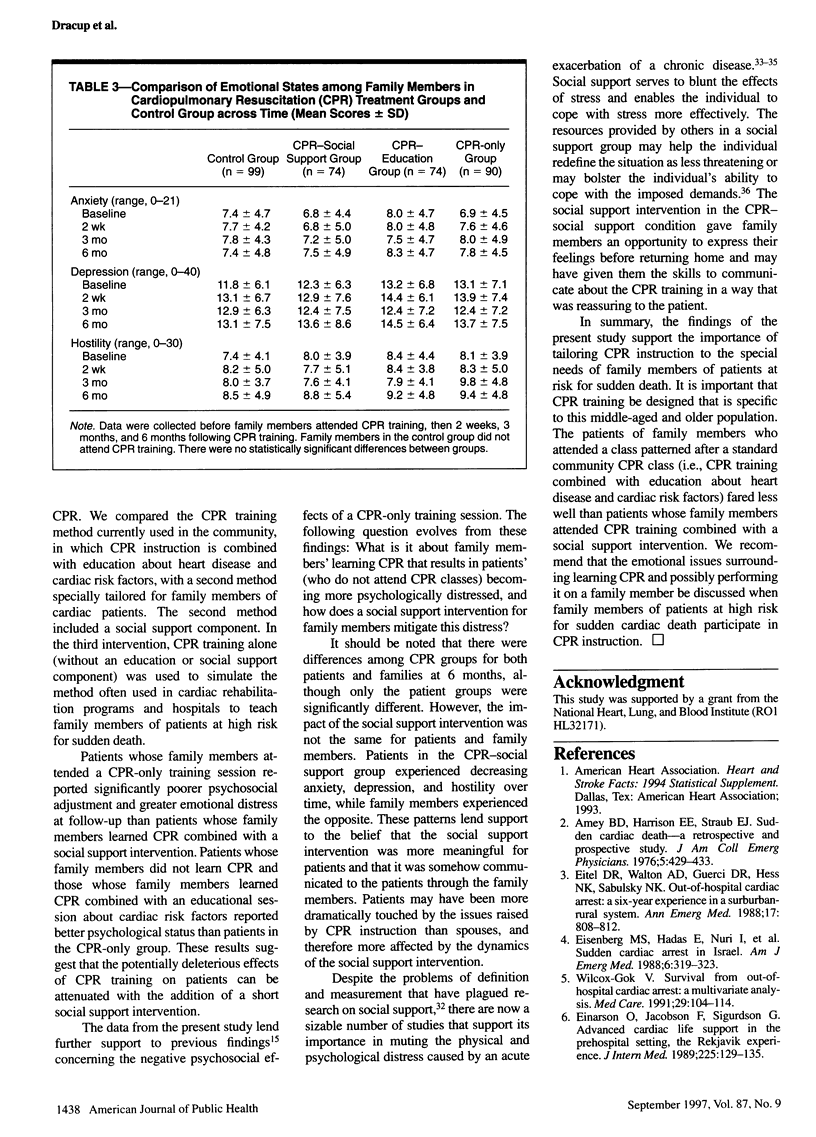
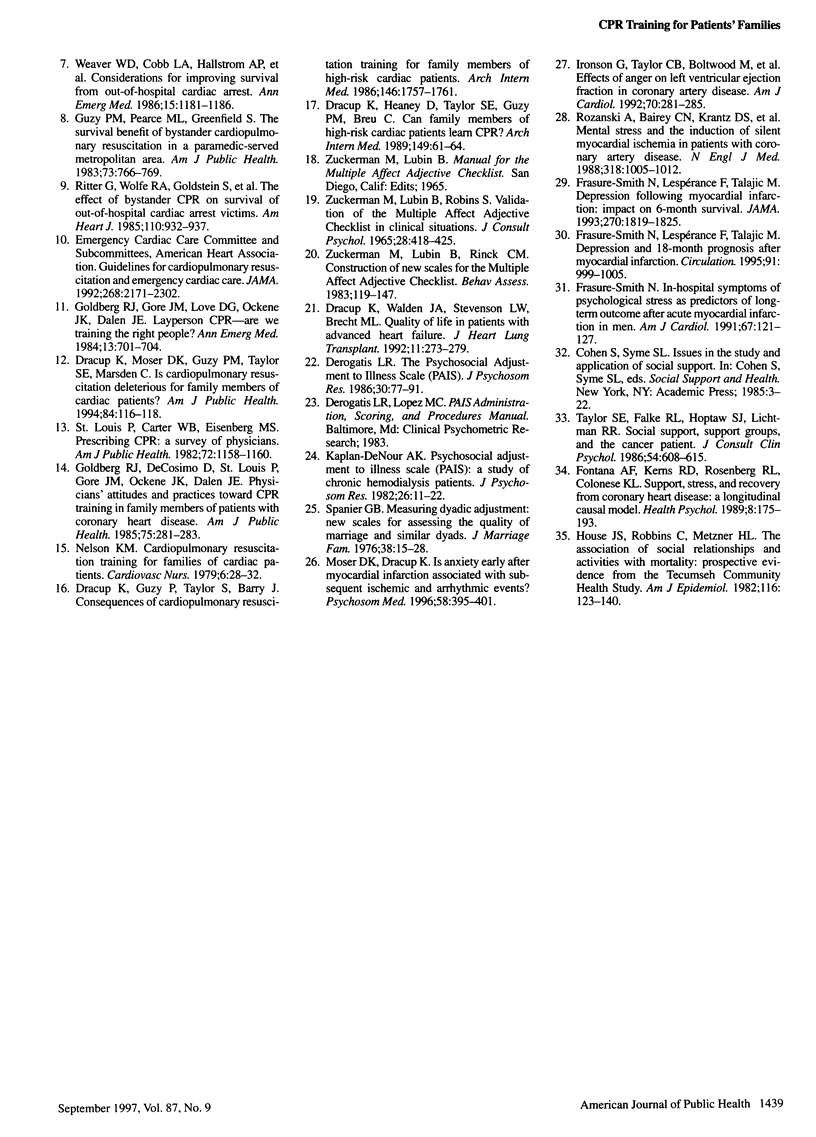
Selected References
These references are in PubMed. This may not be the complete list of references from this article.
- Amey B. D., Harrison E. E., Straub E. J. Sudden cardiac death: a retrospective and prospective study. JACEP. 1976 Jun;5(6):429–433. doi: 10.1016/s0361-1124(76)80251-1. [DOI] [PubMed] [Google Scholar]
- Derogatis L. R. The psychosocial adjustment to illness scale (PAIS). J Psychosom Res. 1986;30(1):77–91. doi: 10.1016/0022-3999(86)90069-3. [DOI] [PubMed] [Google Scholar]
- Dracup K., Guzy P. M., Taylor S. E., Barry J. Cardiopulmonary resuscitation (CPR) training. Consequences for family members of high-risk cardiac patients. Arch Intern Med. 1986 Sep;146(9):1757–1761. doi: 10.1001/archinte.146.9.1757. [DOI] [PubMed] [Google Scholar]
- Dracup K., Heaney D. M., Taylor S. E., Guzy P. M., Breu C. Can family members of high-risk cardiac patients learn cardiopulmonary resuscitation? Arch Intern Med. 1989 Jan;149(1):61–64. [PubMed] [Google Scholar]
- Dracup K., Moser D. K., Guzy P. M., Taylor S. E., Marsden C. Is cardiopulmonary resuscitation training deleterious for family members of cardiac patients? Am J Public Health. 1994 Jan;84(1):116–118. doi: 10.2105/ajph.84.1.116. [DOI] [PMC free article] [PubMed] [Google Scholar]
- Dracup K., Walden J. A., Stevenson L. W., Brecht M. L. Quality of life in patients with advanced heart failure. J Heart Lung Transplant. 1992 Mar-Apr;11(2 Pt 1):273–279. [PubMed] [Google Scholar]
- Einarsson O., Jakobsson F., Sigurdsson G. Advanced cardiac life support in the prehospital setting: the Reykjavik experience. J Intern Med. 1989 Feb;225(2):129–135. doi: 10.1111/j.1365-2796.1989.tb00052.x. [DOI] [PubMed] [Google Scholar]
- Eisenberg M. S., Hadas E., Nuri I., Applebaum D., Roth A., Litwin P. E., Hallstrom A., Nagel E. Sudden cardiac arrest in Israel: factors associated with successful resuscitation. Am J Emerg Med. 1988 Jul;6(4):319–323. doi: 10.1016/0735-6757(88)90146-5. [DOI] [PubMed] [Google Scholar]
- Eitel D. R., Walton S. L., Guerci A. D., Hess D. R., Sabulsky N. K. Out-of-hospital cardiac arrest: a six-year experience in a suburban-rural system. Ann Emerg Med. 1988 Aug;17(8):808–812. doi: 10.1016/s0196-0644(88)80560-2. [DOI] [PubMed] [Google Scholar]
- Fontana A. F., Kerns R. D., Rosenberg R. L., Colonese K. L. Support, stress, and recovery from coronary heart disease: a longitudinal causal model. Health Psychol. 1989;8(2):175–193. doi: 10.1037//0278-6133.8.2.175. [DOI] [PubMed] [Google Scholar]
- Frasure-Smith N. In-hospital symptoms of psychological stress as predictors of long-term outcome after acute myocardial infarction in men. Am J Cardiol. 1991 Jan 15;67(2):121–127. doi: 10.1016/0002-9149(91)90432-k. [DOI] [PubMed] [Google Scholar]
- Frasure-Smith N., Lespérance F., Talajic M. Depression and 18-month prognosis after myocardial infarction. Circulation. 1995 Feb 15;91(4):999–1005. doi: 10.1161/01.cir.91.4.999. [DOI] [PubMed] [Google Scholar]
- Frasure-Smith N., Lespérance F., Talajic M. Depression following myocardial infarction. Impact on 6-month survival. JAMA. 1993 Oct 20;270(15):1819–1825. [PubMed] [Google Scholar]
- Goldberg R. J., DeCosimo D., St Louis P., Gore J. M., Ockene J. K., Dalen J. E. Physicians' attitudes and practices toward CPR training in family members of patients with coronary heart disease. Am J Public Health. 1985 Mar;75(3):281–283. doi: 10.2105/ajph.75.3.281. [DOI] [PMC free article] [PubMed] [Google Scholar]
- Goldberg R. J., Gore J. M., Love D. G., Ockene J. K., Dalen J. E. Layperson CPR--are we training the right people? Ann Emerg Med. 1984 Sep;13(9 Pt 1):701–704. doi: 10.1016/s0196-0644(84)80731-3. [DOI] [PubMed] [Google Scholar]
- Guzy P. M., Pearce M. L., Greenfield S. The survival benefit of bystander cardiopulmonary resuscitation in a paramedic served metropolitan area. Am J Public Health. 1983 Jul;73(7):766–769. doi: 10.2105/ajph.73.7.766. [DOI] [PMC free article] [PubMed] [Google Scholar]
- House J. S., Robbins C., Metzner H. L. The association of social relationships and activities with mortality: prospective evidence from the Tecumseh Community Health Study. Am J Epidemiol. 1982 Jul;116(1):123–140. doi: 10.1093/oxfordjournals.aje.a113387. [DOI] [PubMed] [Google Scholar]
- Ironson G., Taylor C. B., Boltwood M., Bartzokis T., Dennis C., Chesney M., Spitzer S., Segall G. M. Effects of anger on left ventricular ejection fraction in coronary artery disease. Am J Cardiol. 1992 Aug 1;70(3):281–285. doi: 10.1016/0002-9149(92)90605-x. [DOI] [PubMed] [Google Scholar]
- Kaplan De-Nour A. Psychosocial adjustment To Illness Scale (PAIS): a study of chronic hemodialysis patients. J Psychosom Res. 1982;26(1):11–22. doi: 10.1016/0022-3999(82)90058-7. [DOI] [PubMed] [Google Scholar]
- Louis P. S., Carter W. B., Eisenberg M. S. Prescribing CPR: a survey of physicians. Am J Public Health. 1982 Oct;72(10):1158–1160. doi: 10.2105/ajph.72.10.1158. [DOI] [PMC free article] [PubMed] [Google Scholar]
- Moser D. K., Dracup K. Is anxiety early after myocardial infarction associated with subsequent ischemic and arrhythmic events? Psychosom Med. 1996 Sep-Oct;58(5):395–401. doi: 10.1097/00006842-199609000-00001. [DOI] [PubMed] [Google Scholar]
- Nelson K. M. Cardiopulmonary resuscitation training for families of cardiac patients. Cardiovasc Nurs. 1979 Nov-Dec;15(6):28–32. [PubMed] [Google Scholar]
- Ritter G., Wolfe R. A., Goldstein S., Landis J. R., Vasu C. M., Acheson A., Leighton R., Medendrop S. V. The effect of bystander CPR on survival of out-of-hospital cardiac arrest victims. Am Heart J. 1985 Nov;110(5):932–937. doi: 10.1016/0002-8703(85)90187-5. [DOI] [PubMed] [Google Scholar]
- Rozanski A., Bairey C. N., Krantz D. S., Friedman J., Resser K. J., Morell M., Hilton-Chalfen S., Hestrin L., Bietendorf J., Berman D. S. Mental stress and the induction of silent myocardial ischemia in patients with coronary artery disease. N Engl J Med. 1988 Apr 21;318(16):1005–1012. doi: 10.1056/NEJM198804213181601. [DOI] [PubMed] [Google Scholar]
- Taylor S. E., Falke R. L., Shoptaw S. J., Lichtman R. R. Social support, support groups, and the cancer patient. J Consult Clin Psychol. 1986 Oct;54(5):608–615. doi: 10.1037//0022-006x.54.5.608. [DOI] [PubMed] [Google Scholar]
- Weaver W. D., Cobb L. A., Hallstrom A. P., Copass M. K., Ray R., Emery M., Fahrenbruch C. Considerations for improving survival from out-of-hospital cardiac arrest. Ann Emerg Med. 1986 Oct;15(10):1181–1186. doi: 10.1016/s0196-0644(86)80862-9. [DOI] [PubMed] [Google Scholar]
- Wilcox-Gök V. L. Survival from out-of-hospital cardiac arrest. A multivariate analysis. Med Care. 1991 Feb;29(2):104–114. doi: 10.1097/00005650-199102000-00003. [DOI] [PubMed] [Google Scholar]
- ZUCKERMAN M., LUBIN B., VOGEL L., VALERIUS E. MEASUREMENT OF EXPERIMENTALLY INDUCED AFFECTS. J Consult Psychol. 1964 Oct;28:418–425. doi: 10.1037/h0045367. [DOI] [PubMed] [Google Scholar]


